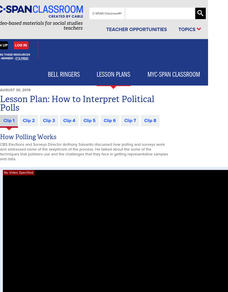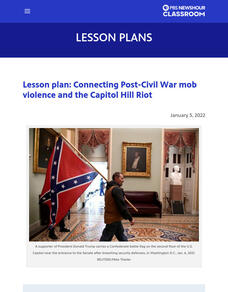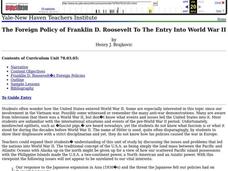Curated OER
Donkeys and Elephants and Voters, Oh My!
Students celebrate party politics. In this American politics lesson, students discover what the 2 main political parties in the country are and discuss their functions. Students then participate in a classroom simulation that requires...
Curated OER
Fighting Political Apathy Among Youth
Students research and describe youth participation in political elections. They survey random adults about their voting behavior and chart the results in a graph. They compile their results to predict future voter participation.
Carolina K-12
Create a City!
What is the purpose of a city charter? What services do local governments provide to their citizens? Is there an ideal way for citizens to behave? Approach these often overlooked yet important questions with your class members by having...
School Improvement in Maryland
Demographic Investigation
What are the factors that influence voting patterns? How do these factors influence government funding? Is participation the squeaky wheel gets the grease? Class members interpret graphs and analyze trends to determine what demographic...
Museum of Tolerance
Influence of Media
We are bombarded with media images expressly designed to influence viewers. Learning how to analyze the intended effects of these images is essential and the focus of an activity that asks viewers to use the provided questions to guide...
C-SPAN
Presidential Birth Requirement
Every president of the United States must be a natural-born citizen, but the definition of natural-born is not as straightforward as it seems. Secondary scholars examine two points of view surrounding the constitutional requirement and...
Advocates for Human Rights
The Rights of Women in the United States
Six diverse activities make up a substantial unit on the women's rights movement in the United States, past and present. A few of the topics at hand: the fourteenth and nineteenth amendments, the Equal Pay Act, the Lily Ledbetter Act,...
PBS
Alexander Hamilton: Lawyer, Writer, and Founding Father
Scholars analyze the impact Alexander Hamilton had on the creation of the United States. Primary documents and video clips give learners a glimpse into the life of one of America's Founding Fathers, arming them with enough information to...
iCivics
Mini-Lesson: Presidential Succession
Who is in line for the presidency? Learners research the line of succession in the executive branch. They analyze the role the cabinet plays in a situation where the president and vice president are not able to serve. Along the way,...
C-SPAN
How to Interpret Political Polls
While numbers don't lie, the reliability of information in a poll may be difficult to discern. After viewing video clips with polling experts, young scholars consider how polls work and the elements of a reliable poll. Extension...
Center for History Education
African Americans and the Democratic Party
Why did African American voters switch from the Republican Party to the Democratic party during the Depression Era? That is the question young historians attempt to answer as they study primary source documents from the period. The focus...
Center for History Education
Did Southern Free Men of Color Fight for the Ideals of the South?
Much of history is distasteful. Primary sources often reveal attitudes acceptable at the time that no longer are. But to understand controversial historical events, historians must examine primary sources that represent a wide variety of...
Newseum
Disinformation Nation: Is It Propaganda?
Propaganda or not? That is the question researchers must answer as they analyze techniques used in ads. Pupils use a three-part definition to determine if the ad is propaganda or advertising.
PBS
Connecting Post-Civil War Mob Violence and the Capitol Hill Riot
Anti-democratic violence is not new in the United States. Learners watch videos and then compare and contrast the 1873 Colfax and the 1898 Wilmington massacres. They then watch a video about the Capitol Hill insurrection of 2021 and...
Curated OER
Gender Shouldn't Limit You!
Young scholars examine political gender biases. In this Teaching Tolerance lesson, students participate in a mock classroom election which requires them to vote for a boy or a girl. Young scholars discuss the election results and gender...
Curated OER
Are There Any Heroes Out There?
Students explore political candidates' viewpoints on issues that contribute to the "common good." In this political candidates lesson, students read and view mixed media to identify political issues that contribute to a civil society....
Curated OER
The Foreign Policy of Franklin D. Roosevelt To The Entry Into World War Ii
High schoolers examine the U.S.A.'s entry into World War II, and Franklin DO. Roosevelt's foreign policy. They analyze the life of I.E.., the election of 1932, and the New Deal.
Curated OER
The Opinions Of The Public
Tenth graders discuss the importance of America's constitutional right to free speech, the difficulty of dealing with public opinion as an elected official and identify the importance of public discussion and the election process.
Curated OER
"Street Fight" Lesson Plan
Pupils watch a film which examine the 2002 Newark mayoral election. They experience the electoral process from the viewpoint of a politician.
Curated OER
Time for Change? A look at Canada's electoral system.
Tenth graders cultivate respect and appreciation for Canadian Parliamentary democracy. They build curiosity and interest in studying citizenship issues related to Parliament and by engaging in a mock election.
Curated OER
Propaganda
Ninth graders examine local examples of propaganda, such as election or political ads in order to identify types of propaganda and find examples of these in various media.
Curated OER
Words In the News- Canada Elects New Government
Learners participate in vocabulary building activities to read an online article about Canada. They complete worksheets and an online quiz. They work in groups to to develop policies for holding a class election.
Curated OER
Hillary Clinton's Voting Record Distorted
Learners examine how political advertisements can be used to deliver messages and stir emotions. Using a political ad from the 2006 Senate election, students generate questions based on the claims in the ads. They research information to...
Curated OER
Standing for MEP!
Students explore, examine and study the European Parliament and assess the qualities for effective leadership. They consider the issues for both European and global matters and then create a effective manifesto speech for an MEP that...
Other popular searches
- Election Day
- Presidential Elections
- Election Day for Kids
- 2008 Presidential Election
- Voting and Elections
- Election of 1860
- Election 2008
- 2nd Grade Election Day
- Mock Election
- Election Day Activities K 3
- Abraham Lincoln Election
- 2008 Elections

























